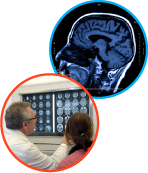Comprehensive Care for Epilepsy and Seizures
Epilepsy is the result of unusual bursts of electrical activity in the brain that cause recurring seizures. These seizures can be as mild as a momentary blank stare or as severe as convulsions that last one to two minutes.
 People of all ages can develop epilepsy, although it is more common in children and older adults. Epilepsy can run in families and it can result from head injuries or strokes.
People of all ages can develop epilepsy, although it is more common in children and older adults. Epilepsy can run in families and it can result from head injuries or strokes.
Diagnosis of Epilepsy
The first priority in the treatment of epilepsy is to determine if there are any reversible causes. We’ll ask you to tell us everything about your seizures that you remember. We’ll also ask about your family medical history and perform a physical exam.
We may perform an electroencephalogram (EEG) because this is a good test for diagnosing epilepsy. We may order imaging studies and we may give you a blood test to look for signs of infection, diabetes, or other conditions which are associated with seizures.
Treatment of Epilepsy
If you have epilepsy, we’ll likely recommend you start with medications. Most people can become seizure-free, or reduce the strength and frequency of their seizures, with the right drugs.
When drugs alone don’t control your epilepsy, we may recommend surgery. Surgery is not appropriate for every person, and there are risks involved, so we will thoroughly discuss this option with you.
Other therapies include vagus nerve stimulation, which is often effective. Some children with epilepsy benefit from a diet that is high in fats and low in carbohydrates (known as the “ketogenic diet”).
Personalized Care for Epilepsy
Our goal is to achieve the best possible control of your epilepsy and help you enjoy the life you want to live. We will work toward that goal as a team.
To make an appointment, please call 832-510-6553.
